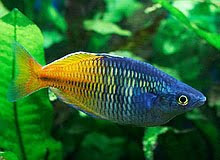Freshwater Fish Melanotaenia Boesemani Rainbowfish
 The Boesemani Rainbowfish also called the " Melanotaenia boesemani " fish is a nice little creature belongs to the family Melanotaeniidae (Rainbowfishes) and creates a colorful centerpiece for any freshwater home aquariums. Firstly described by Allen and Gross in 1980, Boesemani Rainbowfish is a peaceful and very active schooling fish, so its something to be remembered when planning your tank population.
The Boesemani Rainbowfish also called the " Melanotaenia boesemani " fish is a nice little creature belongs to the family Melanotaeniidae (Rainbowfishes) and creates a colorful centerpiece for any freshwater home aquariums. Firstly described by Allen and Gross in 1980, Boesemani Rainbowfish is a peaceful and very active schooling fish, so its something to be remembered when planning your tank population.Boesemani Rainbow males have a beautiful bluish purple head that fades into a gorgeous orange and yellow posterior. Though females are not as colorful, their brilliant silver coloration is equally as stunning against any backdrop of plants or rockwork. Regardless of sex, however, Melanotaenia boesemani boasts the same distinct characteristics as other Freshwater Rainbowfish, including large eyes, a deeply forked mouth, and dual dorsal fins. Like many members of the Melanotaeniidae family, the Boesemani Rainbow also boasts the characteristic blackish-silver band of scales running laterally from gill to tail.
This peaceful Rainbow is an active shoaling fish that does best in a planted aquarium with plenty of room to swim. The uses of dark gravel subtrate may aid in intensifying the colors of the Boesemani Rainbowfishes. When maintaining a school of Boesemani Rainbow, an aquarium that is at least 4 feet in length should be used. The only complaint reported is about their habit of nipping the Hygrophila polysperma. Occasionally, their displays to each other can be a bit violent and involve nipping each other's fins.
 Melanotaenia boesemani is a great fish that mingles well with other Rainbowfish species. Males display the best colors while spawning. They can tear fins and damage scales during the courting so it's best to have 2 males per female so not all the attention is heaped on the female (Males will chase each other as well as the poor female). They will rarely stress each other enough to cause any serious harm but care should be taken to check for Fungus and Childonella which can attack the spawning fish. Make sure you give them a suitable spawning mop or aquarium plants (Java ferns work well).
Melanotaenia boesemani is a great fish that mingles well with other Rainbowfish species. Males display the best colors while spawning. They can tear fins and damage scales during the courting so it's best to have 2 males per female so not all the attention is heaped on the female (Males will chase each other as well as the poor female). They will rarely stress each other enough to cause any serious harm but care should be taken to check for Fungus and Childonella which can attack the spawning fish. Make sure you give them a suitable spawning mop or aquarium plants (Java ferns work well).Melanotaenia boesemani may also spawns on moss throughout the course of several days. The fry hatch after six or seven days and require small pieces of live food and you should have a fry raising tank ready after the egg are attached. Good water conditions, good tank current and the use of spotlights (Which also highlight some amazing colors) to simulate Dawn/Dusk will encourage spawning.
Although Boesemani Rainbows have large mouths, their throats tend to be narrow. Offer foods that are not too large. The Boesemani Rainbow is an omnivore and should be fed a mixed diet of prepared flakes, frozen, and live foods. They are truly a sight to behold. Their colors are truly magnificent, maybe because of the regular feeding with live and frozen food, as well as flake food. These rainbows are almost fully grown, and if you see them swimming together it is stunning. When they are young in the petshop the colors have not yet developed to the fullest. If you do get them, be patient since they are slow growers, but the wait is worthwhile, there is nothing more beautiful than a group of fully matured boseman rainbow fish.









